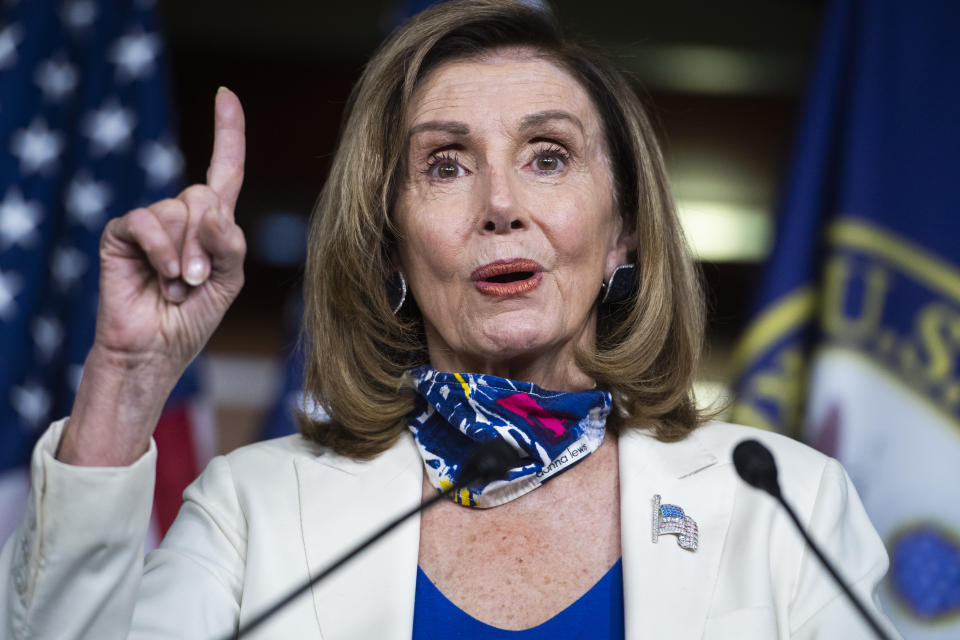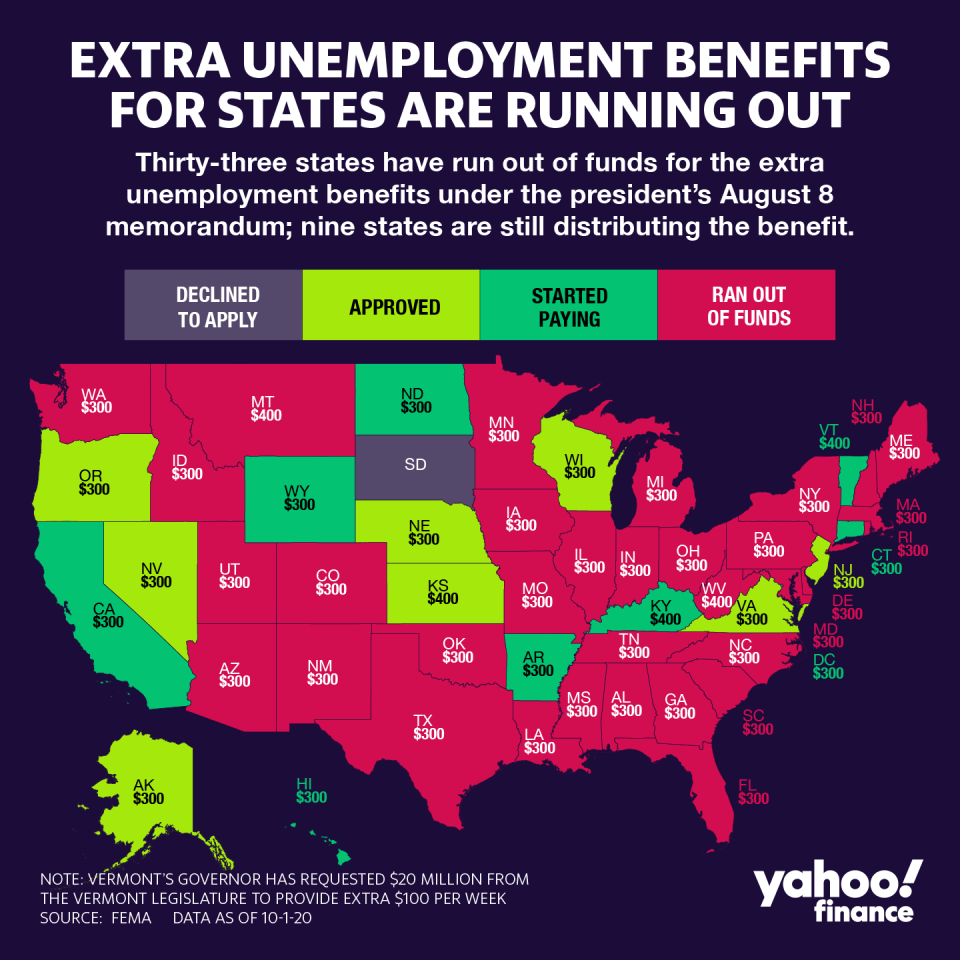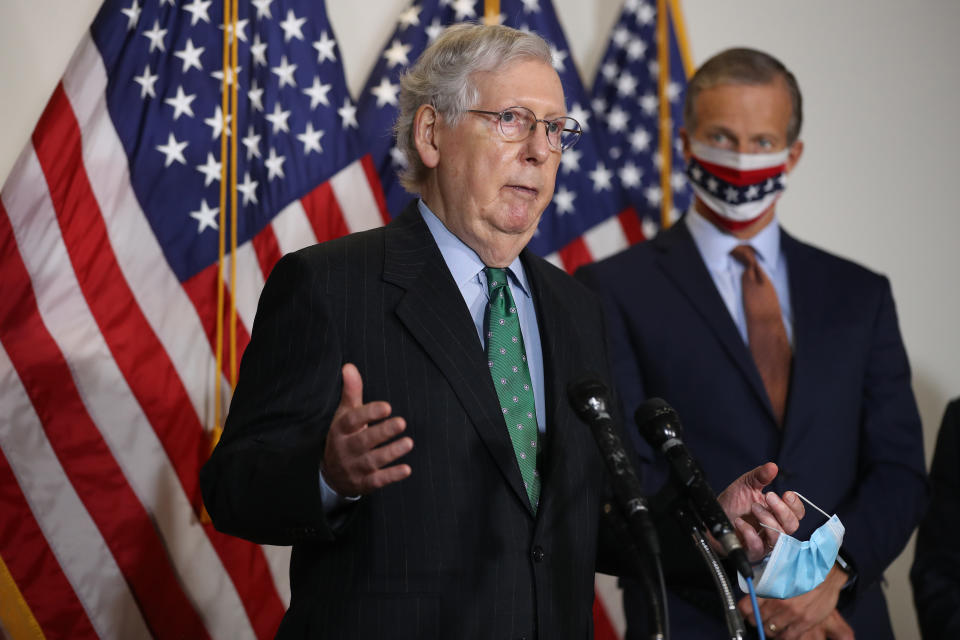Coronavirus stimulus: House passes revised HEROES Act, putting more pressure on White House
The House passed a $2.2 trillion coronavirus stimulus package on Thursday evening, adding additional pressure on Republicans and the White House to make a deal on new pandemic legislation before Congress is expected to take a recess until mid-November amid election season.
The Democratic-controlled House voted 214 to 207— largely along party lines — to pass the bill, which is a scaled-down version of the $3.4 trillion HEROES Act that was passed in May but was never taken up by the Senate. The Republican-controlled Senate likely won’t vote on the latest version unless an agreement is reached between Democrats and the White House.

The White House’s latest proposal is $1.6 trillion, White House Press Secretary Kayleigh McEnany said on Thursday. Treasury Secretary Steven Mnuchin — who has been leading the negotiations on behalf of the White House — returned to the negotiating table with a proposal he said is similar to the $1.5 trillion stimulus package a bipartisan group of House members unveiled in mid-September.
After numerous calls and a meeting this week, House Speaker Nancy Pelosi, D-Calif., and Mnuchin didn’t reach an agreement on the stimulus deal as of Thursday evening but negotiations are expected to continue after the passage of the bill by the House.
“When people say ‘Well, why don't you take a half a loaf?’ Because the children need more than the heel of a loaf of bread,” Pelosi said on Thursday.

‘We’re abandoning the spirit of bipartisanship’
In March, Congress passed the CARES Act providing stimulus to Americans and businesses hurt by the coronavirus pandemic and the resulting recession. Many of those benefits have now expired, and the latest version of the HEROES Act aims to extend some — such as extra unemployment benefits that were previously extended once through executive action — while also providing badly-needed aid to state and local governments, businesses, schools, and individual Americans.
Read more: Here’s what you need to know about unemployment benefits eligibility
The revised version includes $436 billion for state and local governments, $282 billion for education and child care, a second round of $1,200 stimulus checks, an extra $600 of unemployment benefits through January, among other provisions.
“We want to have a bipartisan bill that supports the children. I feel confident that we can do that,” Pelosi said on the House floor ahead of the vote. “But we can't do that if we take the path of least resistance and just say: ‘Let's do whatever they put forth.’”
Republican lawmakers criticized both the price tag of the latest bill and the Democrats for bringing it up for a vote as the negotiations between the two parties are still ongoing.
"Unfortunately by considering this bill today we’re abandoning the spirit of bipartisanship,” Rep. Kay Granger, R-Texas, said on the House floor ahead of the vote. “This bill was crafted without the input from members on our side of the aisle and doesn’t have the support needed to pass the Senate or be signed by the president.”
Senate Majority Leader Mitch McConnell, R-Ky., told reporters on Wednesday that the two parties are “very, very far apart” and referred to the updated HEROES Act as “another multi-trillion dollar far-left wish list with virtually all the same non-COVID-related poison pills as their last unserious bill.”

At the same time, McConnell previously said that the GOP would go along with any deal agreed to by the White House and Democrats.
The two parties disagree on key provisions of any deal as well, including funding for state and local government, funding for the additional unemployment benefits, and tax credits.
“[We’re] still way off in terms of state and local governments,” Pelosi said on Thursday. “We are coming closer on money for our health provisions in the bill.”
‘House Democrats will continue to negotiate’’
With Congress going into recess on Oct. 2 and many lawmakers leaving Washington D.C. to campaign for their upcoming elections, the pressure to reach an agreement is increasing.
Mnuchin initially said that he hopes that the two parties can “have an understanding on an overall package” by Thursday but after several phone calls with Pelosi, the two didn’t reach an agreement. Pelosi’s spokesman said in a tweet that “distance on key areas remain” after the first call.

Pelosi and Mnuchin are expected to continue negotiating even after the passage of the HEROES Act which Democrats see as a way to formalize their updated offer.
“Frankly, if we’d reached a bipartisan agreement yesterday, we wouldn't have this bill on the floor,” House Majority Leader Steny Hoyer, D-Md., said on the House floor ahead of the vote. “Notwithstanding the passage of this bill, House Democrats will continue to negotiate to reach the kind of bipartisan agreement that we believe is necessary to help Americans.”
Denitsa is a writer for Yahoo Finance and Cashay, a new personal finance website. Follow her on Twitter @denitsa_tsekova.
Read more:
Follow Yahoo Finance on Twitter, Facebook, Instagram, Flipboard, SmartNews, LinkedIn, YouTube, and Reddit.

 money
money 

